Climate change: Wales' wet, green landscape at risk - expert
- Published
It’s been one of the driest years for a century in years
More action is needed in Wales to adapt to extreme heat caused by climate change, an expert has said.
Prof Andrew Flynn, of Cardiff University, said the country could face regular repeats of this summer's prolonged heatwaves and dry conditions.
Farmers have warned of a "perfect storm" as crops wither at a time of soaring production costs.
Natural Resources Wales (NRW) said it was monitoring the situation very closely.
An expert panel, including NRW, have reconvened to monitor the impact of the heatwave on water levels and discuss whether to declare an official drought.
As well as seeing record-breaking temperatures, it has been one of the driest years for a century in Wales - which saw just 61% of average rainfall from March to July.
A Met Office amber warning for extreme heat is in place for large parts of Wales until Sunday, in addition to a warning of a "very high" risk of wildfires.
Communities in Pembrokeshire and parts of Carmarthenshire face a hosepipe ban from 19 August.
At Clearwell Farm on the outskirts of Cardiff, it has been "a very worrying time" for farmer David Phillips.
'Perfect storm'
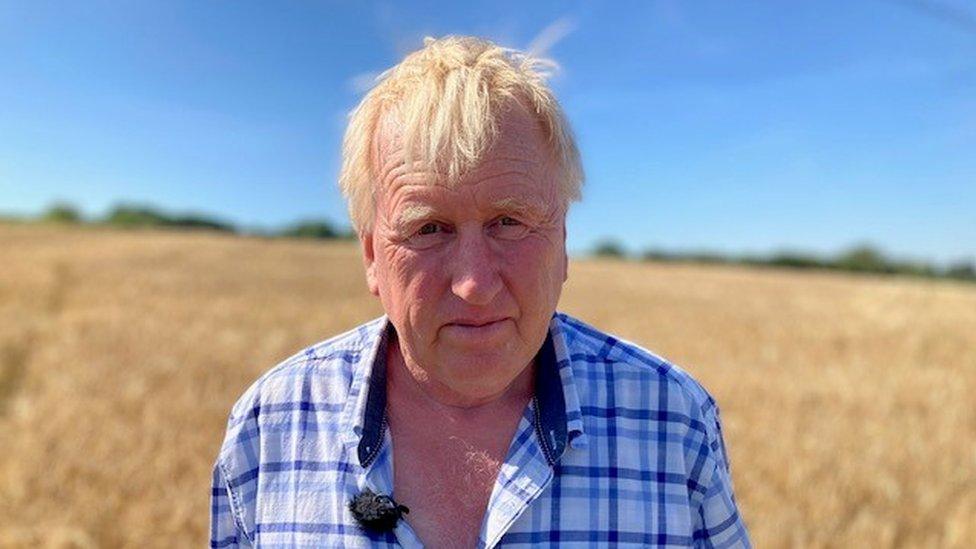
A cold, dry spring has been made worse by difficulties getting fertiliser because of the Ukraine crisis, and now the hot and dry spells, says farmer David Phillips
Standing in a field of barley, he said the stalks which are barely reaching his knees should be well over his waist.
He said a cold, dry spring had been exacerbated by difficulties getting fertiliser because of the Ukraine crisis.
"Then once the crops started growing they've had searing heat on them which has effectively burnt them off rather than ripening them - it's the perfect storm," said Mr Phillips.
His yield would be down by a third and the grain could only be good enough for animal feed rather than being sold for malting, he said.
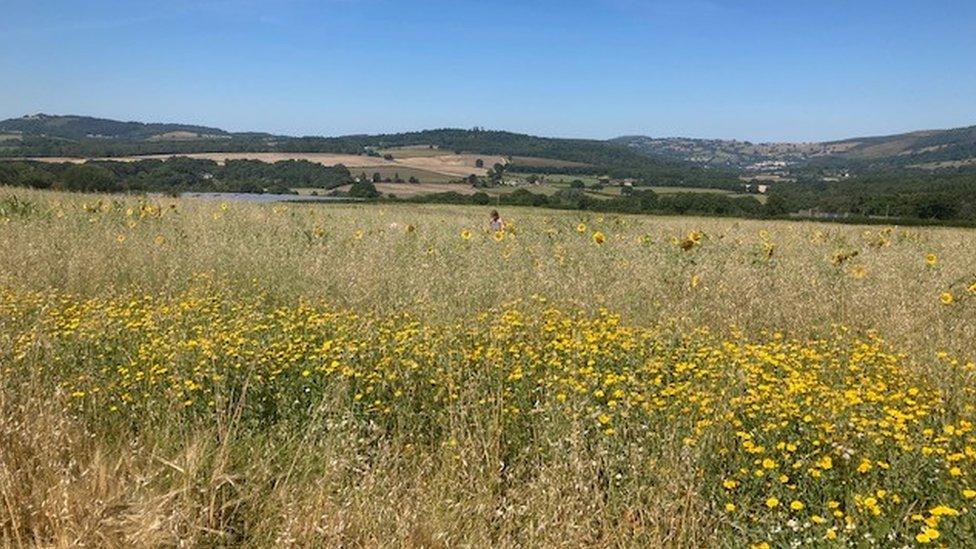
David Phillips says he had to sink a borehole at Clearwell Farm as the water supply from a ground level spring was becoming erratic
The farm also grows a range of specialist crops - pumpkins for Halloween, Christmas trees and a sunflower and maize attraction - all of which are suffering due to the challenging conditions.
Mr Phillips said he had started taking climate change seriously many years ago because "we live and work in it, we could see what was happening".
The family sunk a borehole as the water supply from a ground level spring had become erratic, and they now operate their own wind turbine and solar panels to generate green energy.
But the next generation would need to build irrigation ponds to preserve water, Mr Phillips predicted.
"The water situation is changing dramatically. When we do have storms they tend to be heavier and the water runs off instead of sinking into the ground. The ground conditions lower down are drier too - even during the winter," he explained.
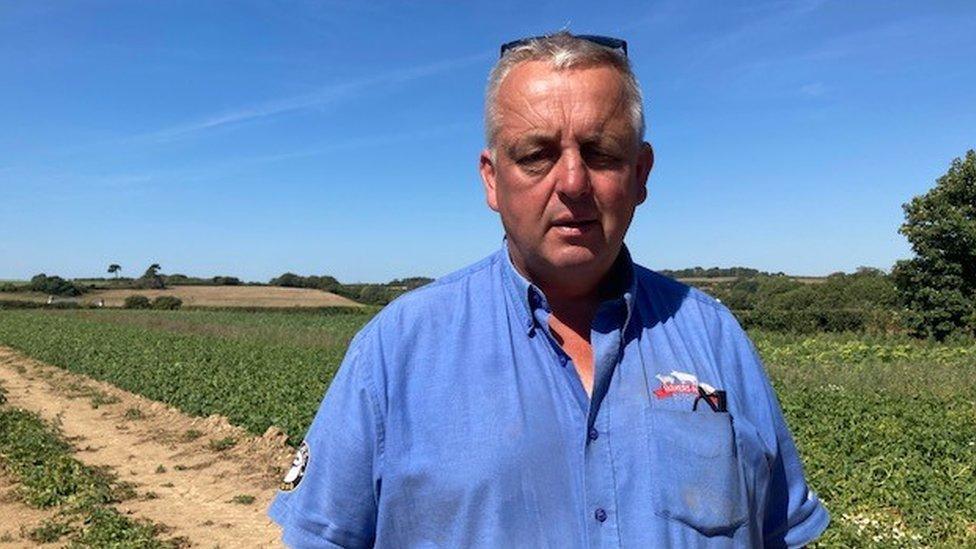
Rhodri Davies says this year's poor crop will have a huge financial burden for his farming business
Wales' potato farmers have also been badly affected.
"Even if we did have rain next week the plants are now starting to die off, they wouldn't bulk up any more so we're losing nigh on 50% of the crop," said Rhodri Davies, of Rosedew farm in Llantwit Major, Vale of Glamorgan.
"There is a financial burden to that because we haven't got the volume of potatoes per acre to sell."
"We've been doing this now for 10 years and this has been the worst year since we started," he said.
However for some growers, the warmer weather means bigger, better quality yields.
'Fantastic year'
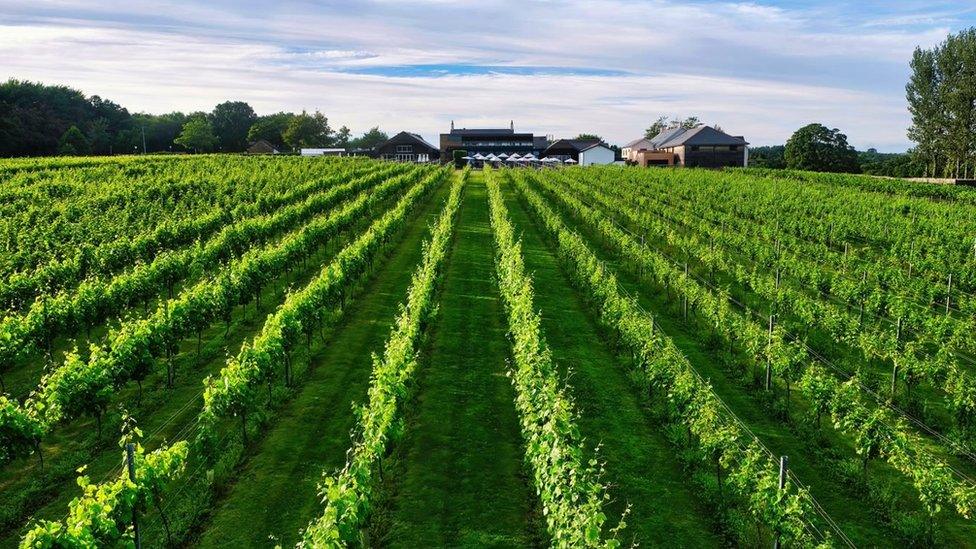
Llanerch Vineyard Hotel normally produces around 12,000 tonnes of grapes a year
Llanerch Vineyard Hotel in Pontyclun, Rhondda Cynon Taf, normally harvests around 12,000 tonnes of grapes every year which in turn produces 12,000 bottles of wine.
This year's warmer weather means they expect to produce 18,000 tonnes of grapes and will able to extend their range of wines.
Managing director Ryan Davies said: "This year is going to be another fantastic year for us.
"It's quite similar weather to 2018 where we've had periods of nice, dry weather which has allowed our vines to ripen quite well.
"They've got quite deep roots. They say a vine doesn't like having wet feet so this weather works really well for the vines and it means we're going to have a really good harvest.
"We'll have more grapes of a better quality because they'll ripen better and we're less likely to have diseases as well."
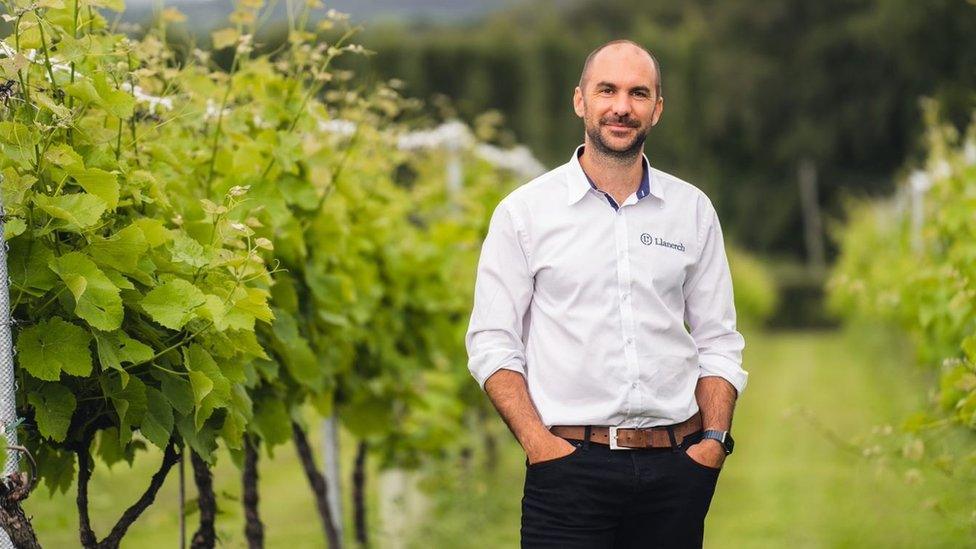
Vineyard managing director Ryan Davies says the warmer weather will produce more, better quality grapes
For his business, the prospect of warmer, dryer weather is a positive.
"We're in a lucky situation," he said.
"Our business thrives in this warm sunny weather. We also run a hospitality business and during the warmer climate more people come out, they dine, we do the vineyard tours and tastings so it works really well for us."
Wales is getting hotter, with a clear trend for increasing sunshine hours too, according to a major assessment of climate risks in 2021, external.
Summer rainfall is expected to decrease by approximately 15% by the 2050s and by between 18% to 26% by the 2080s, with experts warning periods of water scarcity may become more prevalent.
"The weather we're experiencing this summer can be directly linked to humanly induced climate change, the greenhouse gases we've pumped into the atmosphere," explained Prof Flynn.
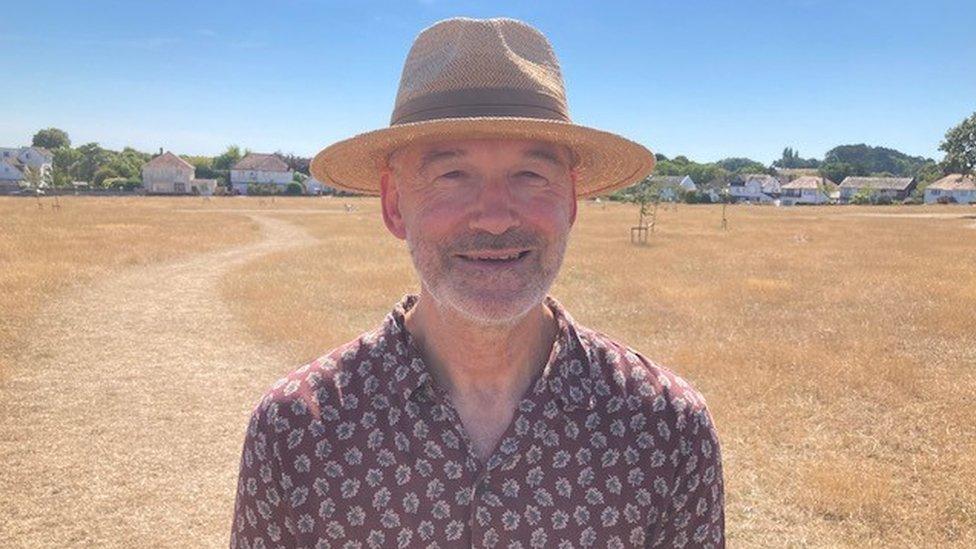
Prof Andrew Flynn says extreme heat will affect all areas of our lives
He specialises in researching ways of adapting to climate change, an area that has traditionally received "less attention" than efforts to cut emissions, he claimed.
"But now we're beginning to experience climate change in our communities we recognise that we need to do much more to think about how we adapt," Prof Flynn explained.
He is currently running a project alongside the Welsh government, NRW, Public Health Wales and the Future Generations Commissioner's office with communities in Rhyl and Swansea to try to better understand future challenges.
When it comes to exceptionally hot or dry weather, it is an area that's seen even less focus because "we typically think of ourselves as a rather wet, green country", he said.
"But the nature of climate change is it's going to increase the variability of the ways in which we experience our environments," he added.
Challenges include how to keep homes and workplaces cool, ensuring transport systems could keep running as well as managing water.
Some of Wales' rivers have reached their lowest levels on record during the recent dry spell, with campaigners warning of devastating impacts for fish stocks.
Independent consultant on freshwater fisheries Richard Garner Williams said anglers should now put a stop to all fishing if they had not done so already.
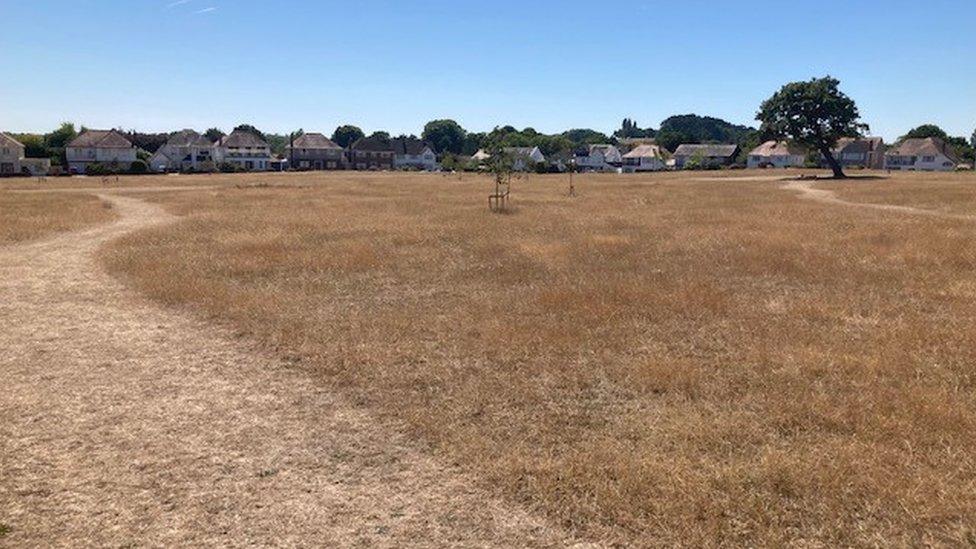
It's been one of the driest years for a century in Wales - this photo was taken of the dry conditions at Cliff Top Park in Penarth, Vale of Glamorgan
"The real danger we're facing now is that these oxygen-deprived waters will become barren of all but the most primitive life forms," he said.
Catrin Hornung, of NRW, said it was monitoring the "significant" situation "very closely", working with partners "to decide on a course of action and what restrictions if any we need to put in place".
Currently, Wales is officially in a state of "prolonged dry weather", she said, and it was "difficult to tell" at this stage whether a drought would be declared in some areas.
"We have a set of indicators or triggers we follow such as river flows, water quality and environmental impacts and we monitor every river against those indicators," she explained.
"We're keeping a very close eye on all parts of Wales and we would encourage people to listen to the advice of water companies and use water wisely."

TRAPPED UNDER THE GROUND: The remarkable 54-hour-long rescue of George Linnane
IOLO: A WILD LIFE: Iolo delves into the archives from the past 25 years

- Published12 August 2022
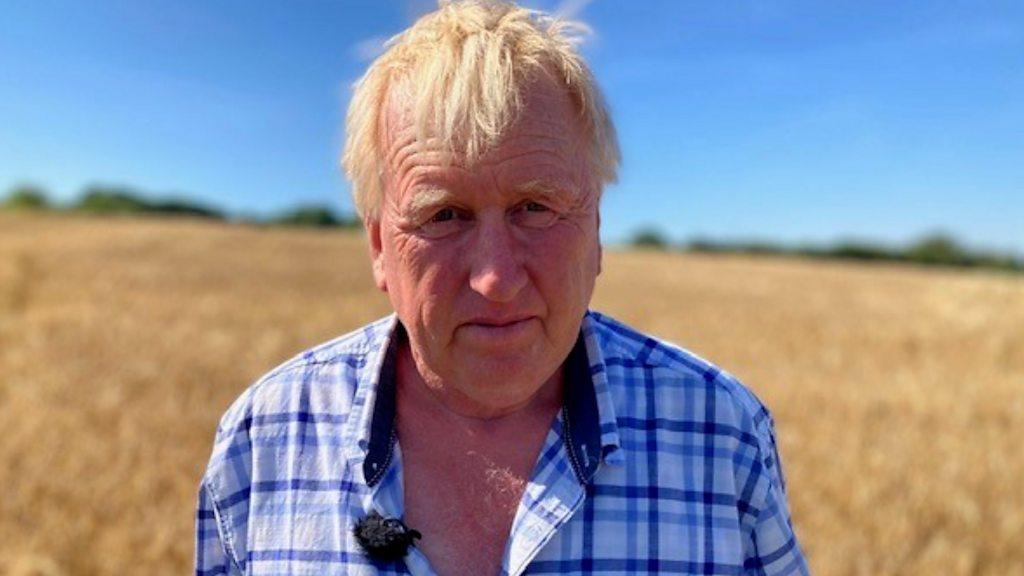
- Published24 June 2021

- Published18 March 2022
